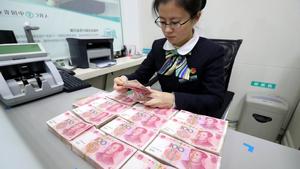 A clerk counts cash at a bank in Huaibei, Anhui province. (PHOTO PROVIDED TO CHINA DAILY)
A clerk counts cash at a bank in Huaibei, Anhui province. (PHOTO PROVIDED TO CHINA DAILY)
While efforts are being made to prevent and control the novel coronavirus outbreak in China, financial regulators and major trading houses have come up with policies and business arrangements for the normal operation of the capital market.
According to an announcement released by the China Securities Regulatory Commission on Monday, the time limit for issuers to respond to the commission's feedback and letters of notification, as well as the period of validity of refinancing approvals, have been removed.
The announcement comes two days after the regulator said that public companies based in Hubei province will be exempted from annual listing fees this year.
According to an announcement released by the China Securities Regulatory Commission on Monday, the time limit for issuers to respond to the commission's feedback and letters of notification, as well as the period of validity of refinancing approvals, have been removed
ALSO READ: IMF chief: China's economy remains resilient
The policy easing announced by the CSRC, together with those released by the central bank and the China Banking and Insurance Regulatory Commission, are all positive news to the market. The message is quite clear at the moment, which is the regulators' strong protection of the real economy and the capital market, said analysts from Guosheng Securities.
Lynda Zhou, chief investment officer for China equities at Fidelity International, said that most of the actions and arrangements taken by the government are helpful, especially the open market operations (OMO) rate cut, OMO injection and measures to support the financing of small-and medium-sized enterprises. Based on these, more incentive policies should be introduced, she said.
The Shanghai Stock Exchange announced on Sunday business arrangements covering six major areas, including review of companies' listing application for the STAR Market, stock issuance, underwriting and listing services, public companies' information disclosure, securities services, optimizing on-site businesses, and the management of services for market entities.
The listing review for initial public offerings at the STAR Market, the review for major asset restructuring of listed companies as well as the update of issuers' financial results usually have a strict time limit on the companies' response. But such time limit will be removed starting Feb 3.
No on-site communication at the Shanghai trading house will be available during the project revision process. Underwriters can reach the bourse via online revision system or phone calls. No listing ceremonies will be held during the epidemic prevention and control period.
Meanwhile, companies registered in Hubei which are newly listed at the Shanghai bourse, will be exempted from initial costs and the annual fees for this year.
Companies that cannot disclose their 2019 annual financial reports due to the epidemic can extend the disclosure of their annual reports till April 30, according to the Shanghai Stock Exchange.
Meanwhile, the benchmark Shanghai Composite Index slumped by 7.72 percent to close at 2746.61 points on Monday, which is the largest daily decline in two decades. The Shenzhen Component Index shed 8.45 percent to close at 9779.67 points. Of the 3,600-plus A-share listed companies, nearly 3,000 companies touched the daily decrease limit of 10 percent.
READ MORE: Experts: China's economy still on even keel
Xia Chun, chief economist of Shanghai-based financial services provider Noah Holdings Ltd, said non-economic external factors, such as political issues, usually have a smaller impact on the stock market and do not last long. The long-term increase of stock indexes will not be affected by these issues. Such a conclusion can also be applied to epidemics and diseases, he said.
Jiang Chao, a senior analyst with Haitong Securities, said China's economic data will pick up in the second quarter as the epidemic gets under control. Combined with the pickup in demand after the epidemic, the economic growth will rebound and so will the stock market, he said.


